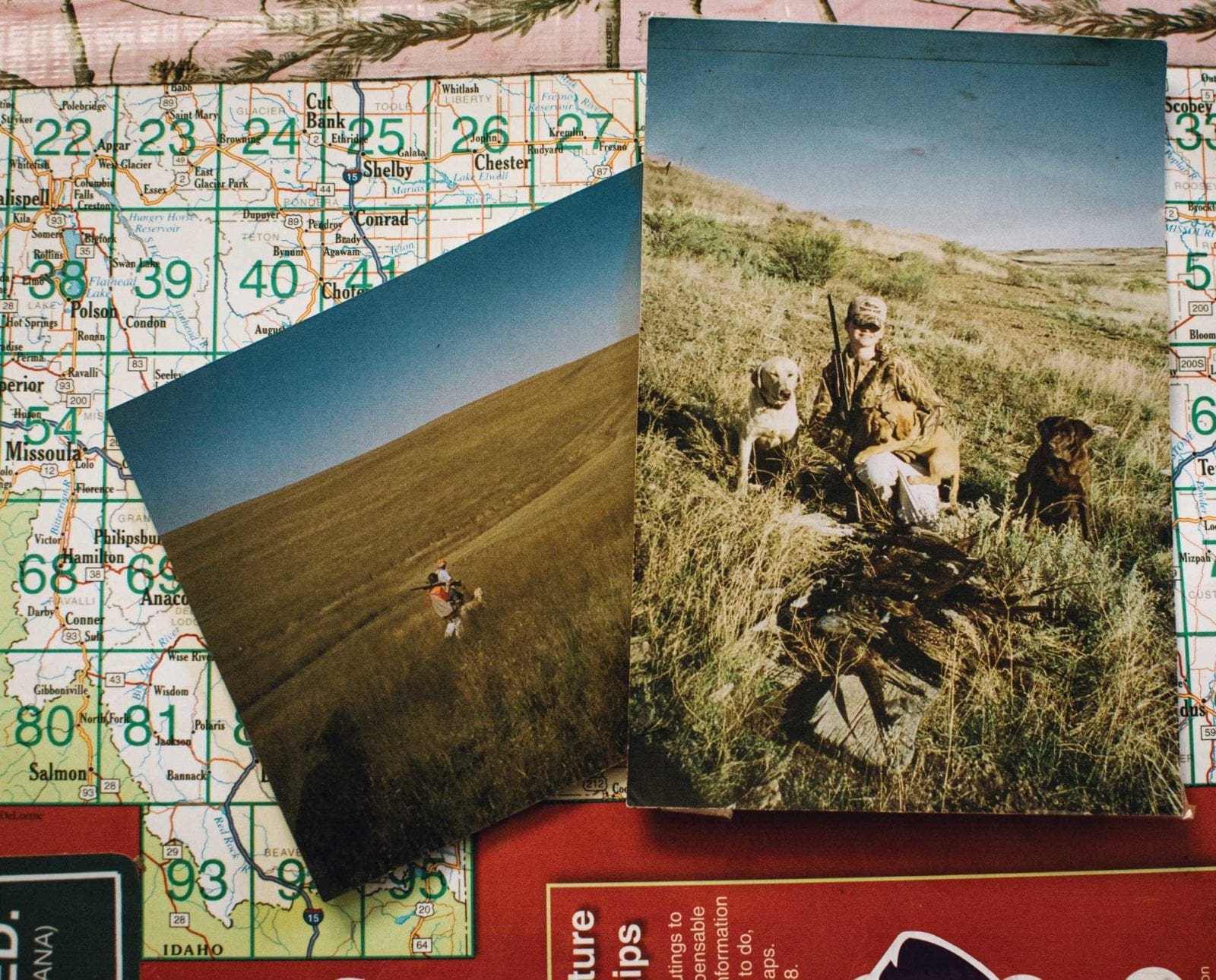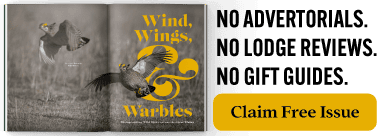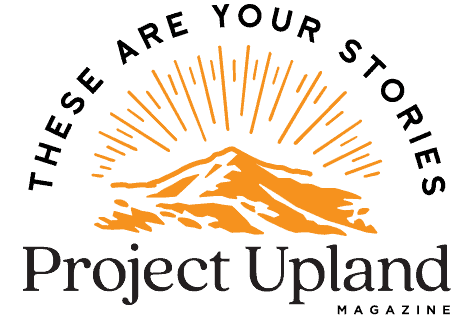Home » Hunting Culture » Lessons from Growing Up in Fields of Upland Birds
Lessons from Growing Up in Fields of Upland Birds

Chloe Nostrant is a writer and photographer (among other things)…
A bird hunter reflects on the moral and life lessons learned in a childhood of upland hunting.
Waking up, I grab my contact case off of the window sill. My bathroom window had been left open, so last night’s cool temperature gave them a nice chill. I put them in and blink a few times to warm them up. Walking out of the bathroom, I catch a glimpse of my old youth shotgun 20-gauge sitting in the corner and remind myself to clean it before going hunting. Its stock was a little short for me now that I had grown up, but it still could get the job done.
The coming of hunting season brings back memories of my childhood, one that included time spent in the prairies of eastern Montana chasing birds. Somewhere along the way I had become more of an angler and less of a hunter. I went outside to unpack my truck from my latest fishing trip. The cold contacts, the crisp fall air, the gun in the corner and truck full of gear reminded me of one of our infamous trips out east.
I was maybe 12 or so, and on a bird hunting trip with my dad and uncle. The men had arisen a little before me to get a head start on coffee. I woke up to the smell of burning hair. Reaching for my glasses, I looked around the inside of our tiny pop-up camper to see that my uncle’s yellow Lab, Curry, had backed himself up against the Mr. Heater, trying to get warm. While my eyes adjusted to what I was seeing, my brain put the pieces together. It might have been the first time I had cursed out loud, but only the dogs heard me. “Oh, shit!” I said as I scrambled out of my sleeping bag to turn off the heater. I shooed Curry away from the heater and judging by his expression, he seemed more upset that I disturbed him than the perfectly shaped bullseye singed on his hind quarters. Moose, a stately chocolate Lab, scrutinized me from her perch on the empty bed. She was waiting patiently for the hunting to start and I was holding her up.
I guessed it was time for breakfast so I grabbed my contact case off the table and unscrewed the tops. My contacts were suspended in the slushy saline, icebound from the freezing night. I buried the case in my jacket pocket, threw on my boots, and swung open the camper door to be met with the words “COUNTY COURTHOUSE.” I had momentarily forgotten where we had chosen to camp. We were parked right on the main drag of some small cattle town in the middle of nowhere Montana.
I started walking down the street toward the restaurant while running through in my mind what I would say to my elders. I couldn’t just say “Oh, by the way, Curry burnt his butt on the heater,” but I couldn’t avoid it either. My dad would understand, but my uncle was tricky. He was what I would consider a “brooding artist type.” Think Frank Lloyd Wright but more western.
I sat down at the table. We said some good mornings and Buck, the curmudgeon cafe owner I’d grown to like, sweetly asked if I wanted something to drink. “I’ll just have some orange juice please.” My dad, on the other hand, asked for a glass of water, to which Buck replied, “There’s water in the coffee.”
“So . . . uh . . . something happened to Curry,” I started. My uncle just looked at me and squinted. My dad looked at him, then me.
“He just leaned against the Mr. Heater and singed his butt.” Then, trying to soften the blow I added, “He’s fine though. I checked. It was only his fur.”
My uncle took a breath and got up from the table without changing his stoic expression. Through the window, I watched him work his way down the street to the camper, let the dogs out, and assess the situation.
“He’s probably fine,” my dad said. I wasn’t sure if he meant my uncle or the dog. I got up and went to the bathroom to put in my freezing cold contacts. The quicker we got into the field, the better.
Coming of age through days of negotiating prickly pear and sagebrush helped define central themes and direction in my life. Learning how to handle firearms with respect, how to work with dogs, how to talk to ranchers and be not just on the land but in it, shaped me into who I am today. I learned to watch where I walk, clean a shotgun, take care of a dog post-porcupine, sit at cowboy bars and listen to all the tall tales. Most importantly I learned the lesson that the landscape shapes everything around it, especially those of us who spend significant time in it.
As a kid walking across sections of land filled with cattle and ring-necked pheasants, I had a lot of quiet reflective time. When a dog would get on the scent, or a deer would spook out of the willows, I’d snap out of whatever daze I was in. I don’t specifically remember what I was thinking about in those days, but I have some guesses.
Probably something to do with wanting to be a real cowgirl and knowing that being a bird hunter on the ranch was as close as I’d get to that. Or maybe how odd it was that cactus grew in Montana, or how far we had walked, or about how much further we had to walk, or how weird it was we camped at the courthouse. I thought about the story my uncle told of my great grandfather dancing on the table at the bar next to the courthouse. And I for sure also thought about the cute cowboy working as a bartender at that same bar.
One of the beautiful things about bird hunting is you learn to talk to people from all walks of life. The ranchers who haven’t seen an outsider in God knows how long, the grumpy cafe owner, the game warden, the discerning sportsman with fancy guns that look equally as nice on a wall as in the field. You get the whole spectrum. We all share a common thread: the fields.
I learned how to communicate with my fellow hunters. Our needs are paramount to our safety in the field. Comfort, hunger, and thirst are all primal demands that need to be attended to. Position in the field and strategy are paramount to a safe and smooth hunt. I learned to connect with the dogs by hand signals and whistles as well as voice commands. I cultivated successful partnerships with the dogs by learning to read their body language.
Ranchers tend to the same land on which elk hunters roam. It’s the same land that the cafe owner sees every day out his window. And it’s the same land the old cowboy at the bar rattles on about, the same land on which my family and I pheasant hunt. Even as a child, I started to piece together slowly that the land was what brought us all together and how beautiful a reality that is.
More importantly, I learned how to think and how to listen. I listened to the wind, the dogs, the cows, the birds. I listened to what my own body had to say. Where was I sore? Was I hungry or thirsty? Why was my vest so heavy? Maybe I shouldn’t have collected so many rocks along the way. I learned to walk, not just walk, but hike for a whole day with my shotgun over my shoulder and burrs stuck to my socks. I learned how to parade up mountains and back down, how to cross streams, get down steep banks and back up. How to move through thick brush or willows, how to watch out for rattlesnakes or holes in the ground. How to cross barbed wire fences and how to read a map.
Today, while cleaning out my truck, I found my gazetteer. I have always loved maps, and got my own copy of the big Montana gazetteer when I was a kid. I flipped through the pages and laughed at my early markings of where we had gone hunting. Those kiddish scribbles of “notes” on hunting spots over the years turned into marked fishing spots with short detailed reports on the water. The markings on the map’s pages were a diary of childhood hunting adventures. “Adventures” might be too slight of a word to describe those days, after all they made me who I am today.
What do you call the most defining moments of your personality and how do you repay the fields that taught you so much?
Chloe Nostrant is a writer and photographer (among other things) living in Livingston, Montana. She was exposed to bird hunting at an early age, tagging along on dove, duck and pheasant hunts with her dad and one or two of the family's beloved labs. After moving to Montana with her family when she was 11, she spent countless days hunting and fishing her way across the state. After a brief break from hunting (that dang college gets in the way) she stepped back into the field. Her photography and writing focuses mainly on life in the modern American West with a strong focus on hunting and fishing. She works full-time at George Anderson's Yellowstone Angler.




Thanks Chloe, for that wonderful article about your hunting experience as a child. I loved the way you used your senses to describe your feelings because we all pay attention to our senses and those things are recorded to our memories throughout our lives. I’m glad you had a positive experience and were able to translate it to words and invite us all in to share it.
Thank you Chloe,
So wonderful your father got you out doing those things when you were a young girl! I’m 65 now and an avid bird hunter in MT. I got my love of the land from my father also. Really wonderful piece about feeling the land. Thank you!